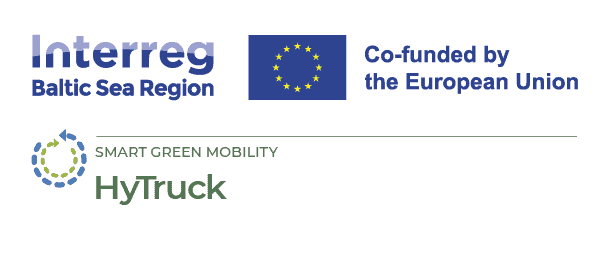Developing a transnational network of hydrogen refuelling stations for trucks (HyTruck)
| Title | Developing a transnational network of hydrogen refuelling stations for trucks |
| Abbreviation | HyTruck |
| Programme | Interreg Baltic Sea Region 2021-2027 |
Project partners
- Ministry of Economy, Infrastructure, Tourism, and Labor of Mecklenburg-Vorpommern (Germany) (lead partner)
- Ministry of Transport and Communications of the Republic of Lithuania (Lithuania)
- Polish Alternative Fuels Association (Poland)
- Vidzeme Planning Region (Latvia)
- University of Tartu (Estonia)
- Chalmers University of Technology (Sweden)
- Reiner Lemoine Institut (Germany)
- Localiser RLI GmbH (Germany)
- CLIC Innovation (Finland)
Project objectives
The objective of HyTruck is to support public authorities in steering the development of a network of hydrogen refuelling stations (HRS) suited for large trucks in the Eastern part of the North Sea-Baltic TEN-T corridor with harmonised standards across borders. HyTruck aims at solutions enabling public authorities to address all relevant (spatial, economic, environmental and technological) dimensions when planning HRS.Activities
- Digital spatial planning toolkit – The toolkit will be a publicly accessible component-based web application that shall be available via the one-stop-shop. It consists of a spatial database, a virtual H2 marketplace and an interactive web-based map with analytical GIS functions to support the planning process.
- Over-arching assessment model for HRS planning - It allows the techno-economic assessments focusing on comparing different hydrogen production options as well as hydrogen distribution alternatives including large centralized facilities vs decentralized onsite production. The model also includes an environmental life-cycle assessment for the different options. It supports the planner in finding the best possible combination between maximum environmental benefit (measured in CO2 savings potential) and the most cost-effective H2 supply options for fuel cell trucks.
- Proposals for common technological standards to ensure that the system can be used in any country without restrictions.
- Guideline for public authorities "Roadmap to planning HRS infrastructure” to ensure that public authorities will be able to streamline their undertakings and integrate their local infrastructure developments into the transnational context.
- Regional pilot implementation plans – it is planned to have five regional pilot implementation plans; preparatory research activities will be done to develop a spatial planning concept for locate HRS in five regions in five different countries - Germany, Poland, Lithuania, Latvia, Finland.
- Five spatial planning concepts will be developed • Rostock Region in DE • Poznan Region in PL • Kaunas Region in LT • Vidzeme Region in LV •Helsinki Region in FI. The spatial planning concepts for each pilot region serve to determine the locations for HRS and to lay foundation for a comprehensive HRS infrastructure in the BSR. The starting points for the pilot projects are cities that form urban nodes in the TEN-T corridors.
- One-stop shop for HRS – it is planned to create a joint internet platform for stakeholders from the transport sector, H2 producers and filling station operators, academia & public sector that goes beyond the HyTruck project. Cooperation with two already existing and well established network structures STRING and Scandria Alliance is planned.
- Input to national and transnational funding and policy programmes.
- Transnational exchange channel on HRS; organization of informative seminars and international conference.
Results
- Joint elaboration of BSR-wide protocol of technological standards and Proposal for common technological standards to determine optimal location for HRS in BSR.
- Signed Memorandum of understanding on harmonized technological standards for HRS.
- Guideline for public authorities: “Roadmap to planning HRS infrastructure”.
- One-stop shop for HRS.
- Improved knowledge of local municipalities, entrepreneurs and society about alternative fuel.
Budget
Total budget: 2 557 583, 20 EUR
VPR budget: 274 600, 00 EUR
Implementation period
01.01.2023-31.12.2025
Contacts
Rita Merca
Mobile: +371 29476373
Email: rita.merca@vidzeme.lv

